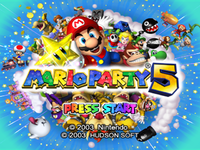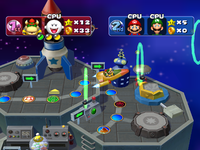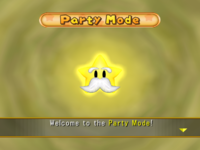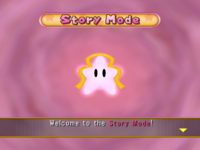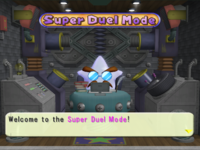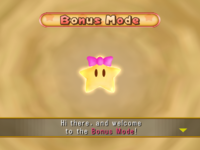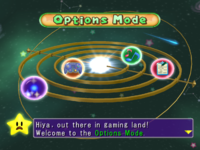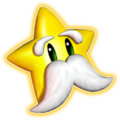Mario Party 5
Template:Infobox Mario Party 5 is the fifth installment in the Mario Party series. Like its namesake, it is a party game for the Nintendo GameCube that up to four players can participate in, succeeding the Nintendo GameCube's first Mario Party installment, Mario Party 4. It was first released in November 10, 2003 in North American territories, approximately one year after Mario Party 4 was released. As in other Mario Party installments, players interact with one another in virtual boards, playing as various Mario characters. Players then can participate in various mini-games at the end of every turn in the board, each with their own set of rules and settings. The most notable change in this game is that the item system that was first introduced in Mario Party 2 was replaced with the new capsule system, where players can not only use them for their own advantage but set up traps for other players to fall into; Mario Party 6 and Mario Party 7 would later return the capsule system (now called Orbs) and add new mechanics to the capsules. Mario Party 5 also introduces new modes such as Super Duel Mode, where players can battle each other on battle machines and Bonus Mode, where players can play special mini-games, similar to Mario Party 4's Extra Mode. The game is also significant for being the second in the series to introduce 3D game boards. Previous titles, all except for Mario Party 4, use pre-rendered backgrounds, which are static and limited in their presentation. As a result, all subsequent Mario Party titles, with the exception of Mario Party Advance on the Game Boy Advance, have employed 3D backgrounds allowing for much more dynamic fields of play.
Mario Party 5 features the Star Spirits (known as Star Guards in this game) from Paper Mario as the main hosts of the game, where one of them guides the player through each of the game's various modes. The game features a dream-theme, where the game takes place in the Dream Depot and each of the boards' names have "Dream" suffixes. In the game's Story Mode, geared towards single players, a playable character has to face Bowser and the Koopa Kids (known as Mini Bowser in the PAL version), who invade the Dream Depot, and need to challenge them in every stage.
Mario Party 5 became part of the Nintendo Player's Choice label in October 22, 2004, and won the Console's Children award at the 2004 Interactive Achievement Awards.
Story
From the Mario Party 5 instruction booklet:
In the night sky, past the moon and beyond the stars, there's a dream world known as Dream Depot, where everyone's dreams come together. This is the real land of dreams... In this land, there are Star Guards who protect the dreams of all.
One dreamy night, the Star Guards thought of something.
"Many dreams arrive here at Dream Depot every day," they said, "so... why don't we offer those with the power of dreaming a chance to visit?"
In the end, they decided to invite Mario and his closest friends because, when it comes to dreamers, nobody dreams bigger than they do!
So the Star Guards prepared for their guests' arrival by creating many fun-filled games for them to play. And that is how the story of Mario and his friends both old and new began!
In Story Mode, Bowser and Koopa Kid are planning to ruin everyone's dreams, and players must stop Bowser from taking over said dreams. If players clear the six boards, they must face the Koopa Kids in Bowser Nightmare, and if they beat that board, they fight Bowser in Frightmare.
Gameplay
The gameplay in Mario Party 5 is the same as in other installments. Players move around the board by rolling a Dice Block numbered one through ten. The game begins by deciding the order of play with Dice Blocks. Players who roll the highest numbers get to start their turn sooner. Then players are given ten coins to start. The object of the game is to collect as many Stars as possible. Each Star is worth 20 coins. Stars appear in random, set locations, which get shuffled every time a player acquires a Star. Players can earn coins to purchase these Stars by either landing on spaces or winning mini-games. The spaces players land on can either be beneficial or harmful: for example, Plus Spaces award players three coins, Minus Spaces deduct three coins, and ? Spaces cause an event to happen, which is dependent on the board being played. Players also have the option to receive items called capsules at capsule machines, which replace the Item Shops of the previous entries of the Mario Party series. Players can toss capsules onto spaces or use capsules on themselves for a price. Plus or Minus Spaces that have an icon on them mean that they are under influence of a capsule and their effects is dependent on the capsule effect it has.
After everyone moves, a mini-game starts; the type of mini-game is determined by the color of the panel, which is dependent on the space the player has landed on. If everyone has the same color, then a 4-Player mini-game begin. If players have equal amount of colored panels, a 2-vs.-2 mini-game is played. If all players except one have landed on the same space, a 1-vs.-3 mini-game commences. Sometimes, a battle mini-game take place and everyone pays coins to put at stake to compete, with winning players receiving more coins than lower-placed players. After a mini-game, players earn 10 coins if they win, with Bonus mini-games having the potential of players receiving even more coins. Other mini-games such as Duel, Bowser, and DK mini-games require a specific space-landing or item usage for the mini-games to be played; these do not happen at the end of a turn as normal mini-games. After normal mini-games are played, the game saves and the next turn begins, repeating the process until the end of the game.
When there is only five turns left, the Last Five Turns Event starts. Here, Bowser announces the current standings and asks the player in last place to spin the wheel to add a new rule for the remainder of the game. Also, when two players land on the same space, a Duel mini-game begins.
After the final turn, Eldstar announces the results starting with the current Star count and the final coin count. Then, players receive three Bonus Stars based on their performance before announcing the winner of the game, which is the player with the most Stars overall (with coins or Dice Blocks serving as the tiebreaker).
Game modes
All six of the game's modes are hosted by a member of the Star Guards, barring Klevar who guides players through the selection and description of the modes and hosts some ? Space events located in the boards of the game.
Party Mode
The main mode of any Mario Party game, including Mario Party 5, this game mode is hosted by Eldstar. Up to four players can enjoy the mode as they partake against each other in the game's boards to collect the most Stars. Four players always participate in the game. If there are not enough human players, the remaining players are controlled by CPU. Characters are then chosen out of the roster of ten playable characters; CPU players can have their difficulty adjusted as their characters are chosen. In a Team Match, players can choose which character can be on what team. The main rules of the game are played in this mode; however, players can adjust various settings to change up some aspects of the game before they play the mode.
- Rules: Players can play in Battle Royal, where four players all compete in a free-for-all, or Team Match, where two teams of two play against each other.
- Number of Turns: This controls how many turns the game lasts. Players can set from 10 to 50 turns, with increments of 5 turns in between.
- Mini-Games: Forgoing the custom mini-game set from Mario Party 4, mini-games are grouped into specific categories, which are All, Easy, Action, Skill, and Goofy mini-games.
- Bonus Awards: If turned on, hidden blocks containing coins in them become available in the board map. Also, Bonus Stars are awarded at the end of the game if the setting is turned on. They are the following:
- Mini-Game Star: Awarded to players who have received the most coins from mini-games. Starting with this game, Battle mini-games count towards the Mini-Game Star.
- Coin Star: Awarded to players who have accumulated the most coins in the game.
- Happening Star: Awarded to players who have landed on the most ? Spaces.
- Handicap: This lets players adjust the number of stars they start out with, giving them an advantage. Up to nine stars can be given initially.
After a board is chosen, the game then starts. Players can access the pause menu by pressing ![]() in the middle of the game, where they can see the number of turns they have left and also access more features that can be toggled. These are the features as of follows:
in the middle of the game, where they can see the number of turns they have left and also access more features that can be toggled. These are the features as of follows:
- Controller: Players can adjust the control settings for each character. Players can turn CPU players into human places, vice-versa, or adjust their difficulty.
- Mini-Game Explanation Screen: Players can either view or skip the mini-game explanation screen.
- CPU Mini-Game: Players can either view or skip mini-games involving only CPU characters.
- Mini-Game Pack: Players can adjust which type of mini-games that can be played, from All, Easy, Action, Skill, or Goofy mini-games.
- Rumble Settings: Players can toggle the Nintendo GameCube controller Rumble Feature on or off.
- Message Speed: Players can change the speed messages display, from Fast, Normal, or Slow.
- Save: Players can choose to not save game data, save game data at the end of the current turn, or save the game data at the end of every turn.
- Quit: This quits the game and returns to the main menu. Players can leave off where they have last saved.
Story Mode
Story Mode is a single player mode hosted by Misstar. In this mode, the player participates on seven, smaller, modified boards facing the three colored Koopa Kids. The difficulty is dependent on what the player has set before playing on the boards, and players can adjust which mini-game set will be used before play. The main objective is to eliminate all three of the Koopa Kids before they eliminate the player; in order to eliminate a Koopa Kid, the player must make them lose all of their coins, either by dueling them or using capsules to make them lose coins. If players loses all of their Coins, they lose the game. In this game mode, mini-games are not played at the end of every turn. Unlike Party Mode, players can duel Koopa Kids by simply passing them rather than either landing on a Duel Space, using a Duel Orb, or landing on the same space as them. There are no coins put at stake; rather, a set number of coins are lost depending on which character wins and which character passes who. If players pass or land with a Koopa Kid, players losing have 5 coins deducted while winning against a Koopa Kid costs him 15 coins. When the Koopa Kid passes or lands on the players, they duel the players; losing costs the Koopa Kids 5 coins while winning cost players 10 coins. All the Koopa Kids move at the same time, quickening game play.
A new space introduced is the VS Space, exclusive to Story Mode. Landing on it triggers mini-games dependent on the number of Koopa Kids on the playing field; if there are three Koopa Kids, a 1-vs.-3 game is played. Two causes a 2-vs.-2 mini-game to be played, where the player is partnered with a CPU Toad. Only one Koopa Kid on the board causes a Duel mini-game to be played. An error is present in the instruction booklet of the game: the instruction booklet lists a 2-vs.-1 mini-game that can be played upon landing on this space when no 2-vs.-1 mini-games can be played in Mario Party 5. In addition to the exclusive VS Space, DK Spaces and Bowser Spaces have their rules changed. If a Koopa Kid lands on a DK Space, half of his coins are taken away. Players who land on a DK Space have 10 coins rewarded. The flipside occurs for Bowser Spaces: Bowser takes half a player's coins away upon landing on the space while a Koopa Kid receives 5 coins.
After the player beats four of the six default boards, the player then battles the Koopa Kids in the unlockable board, Bowser Nightmare. After the players beat the Koopa Kids in that board, the player faces Bowser in Frightmare. Upon winning the mini-game, players beat Story Mode, unlock Frightmare to play in Mini-Game Mode, and unlock the Bowser Nightmare board to play on in Party Mode.
Mini-Game Mode
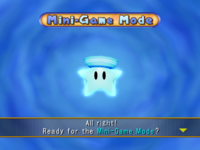
Mini-Game Mode is hosted by Muskular, where up to four players can play the mini-games of Mario Party 5 that they have unlocked. Mini-games are unlocked by simply playing them in Party Mode or Solo Mode at the end of every turn. Mini-Game Mode offers six ways to play the mini-games.
- Free Play: Players can play any mini-game they have unlocked. Players need to have unlocked at least one mini-game to access this mode.
- Mini-Game Battle: Players play a random assortment of 4-Player, 1-vs.-3, or 2-vs.-2 mini-games, where they advance when they win a mini-game. The size of the game can be set at 3, 5, or 7 wins to overall win the game. Players need to play at least one 4-Player, 1-vs.-3, and 2-vs.-2 mini-game to play.
- Mini-Game Circuit: Players drive around a race-track in cars, where the goal of the game is to be the first player to reach the finish line. Players play mini-games, and whoever wins the mini-game uses the Dice Block to move forward. Capsules can be awarded to players who win the mini-game, and those who lose the mini-game do not receive the capsule's effects. Three areas are present in the game: the Normal Area, the Battle Area and the Bowser Area. The Normal Area has no effect when landed on, the Battle Area commences a Duel mini-game where losers are moved back depending on the roll of the Dice Block, and the Bowser Area causes players to play a Bowser mini-game, where the losing players are moved back a number of spaces decided by Bowser. Players need to play a 4-Player, 1-vs.-3, 2-vs.-2, Bowser, and a duel mini-game to play this game. If at the end of the game that there is a tie, the winner is decided by a Dice Block roll.
- Mini-Game Decathlon: Players earn points in ten set mini-games dependent on their performance on those mini-games. Decathlon records can then be seen in the Options Mode of this game. The following mini-games need to be unlocked to play Mini-Game Decathlon: Ground Pound Down, Chomp Romp, Flower Shower, Leaf Leap, Night Light Fright, Dinger Derby, Hydrostars, Will Flower, Later Skater, and Triple Jump.
- Mini-Game Wars: Players need to capture 19 hexagonal tiles on a board by winning 4-player mini-games and battle mini-games. Players can claim a tile when it is flashing and can capture other opponent's tiles by surrounding the tile. Whoever has the most tiles wins the game. At least one 4-player mini-game needs to be unlocked to play this game.
- Mini-Game Tournament: Players play duel mini-games in a tournament-like setting; players advance the bracket when they win a mini-game. Losing players can compete in a losers bracket for 3rd and 4th place slots. At least one duel mini-game needs to be unlocked to play this mode.
Super Duel Mode
- Main article: Super Duel Mode
Super Duel Mode is a mode hosted by Skolar where players buy and assemble machines using points earned by playing mini-games. The machines come with a body, tire, engine, and weapon, and are used to pit against opponent machines in a battle arena. Players can either battle, capture flags, or shoot Robo-Rabbits in order to win. Players can either play in tournaments or against each other. Up to two players can participate in this mode, though save data can be handled by a third player.
Bonus Mode
In Bonus Mode, hosted by Mamar, players could play one of three bonus games that are not available in any other mode: Beach Volleyball, Ice Hockey, and Card Party. All of the three bonus games come with their own set of rules: Card Party is a four player battle royale where players need to find Star Cards to win the game while Beach Volleyball and Ice Hockey are 2-vs.-2 bonus games that play as their sports' namesakes.
Options Mode
Options Mode is hosted by Kalmar where players can change settings or view records. The following are actions players can perform:
- View Mini-Game Packs: Players can view which category called packs each mini-game is under. The following packs are All, Easy, Action, Skill, and Goofy mini-games.
- Set Rumble: Players can toggle the Nintendo GameCube Rumble Feature on or off.
- Set Music: Players can switch between Stereo, Mono, and Surround sound. In addition to those settings, players can listen to background music and character voices.
- View Records: Players can view mini-game high scores, board map records for Party and Solo Modes such as the number of times the board map is played, the number of stars collected, and the times characters have won each board, the Mini-Game Decathlon records, and Super Duel Mode records.
Playable characters
Mario Party 5 returns the playable characters from Mario Party 4, aside from Donkey Kong, who is now the host of his own space, while also introducing new playable characters, featuring ten playable characters in total. However, the new playable characters (Toad, Boo, and Koopa Kid) are not playable in Story Mode (similar to Princess Daisy and Waluigi in Mario Party 3), as Koopa Kid is the player's opponent and Toad is the player's partner if there are two Koopa Kids remaining. Despite Donkey Kong's role as an NPC, he is an unlockable character in the game's Super Duel Mode. He can be unlocked by defeating him in a tournament on Hard difficulty.
Returning playable characters
- MP5Yoshi.PNG
- WallyShot Party 5.png
New playable characters
Tag teams
Mario Party 5 brings the ability for players to team up from Mario Party 4 back and extends the concept. In this game, players now share coins and their Player Panel on the screen. Unique team names are also given out to all combinations. Here is a table containing this game's possible team names, all of which are carried over into Mario Party 6.
| Mario |
Luigi |
Princess Peach |
Princess Daisy |
Yoshi File:MP5Yoshi.PNG |
Wario |
Waluigi File:WallyShot Party 5.png |
Toad |
Boo |
Koopa Kid | |
|---|---|---|---|---|---|---|---|---|---|---|
| Mario |
Mario Bros. | Cutest Couple | Nice Couple | Famous Combo | Alter Egos | Pseudo Bros. | Best Buds | Old Acquaintances | Uneasy Allies | |
| Luigi |
Mario Bros. | Green Escort | Steady Sweeties | Green Bros. | Unloving Bros. | Unlikely Bros. | Good Pals | Scare Pair | Friendly Enemies | |
| Princess Peach |
Cutest Couple | Green Escort | Lordly Ladies | Regal Friends | Royal Pain | Anti-Couple | Royal Family | Royally Spooky | Trouble Brewing | |
| Princess Daisy |
Nice Couple | Steady Sweeties | Lordly Ladies | Royal Ride | Mismatched Pair | Awkward Date | Royal Pals | Haunted Flower | Grudging Allies | |
| Yoshi File:MP5Yoshi.PNG |
Famous Combo | Green Bros. | Regal Friends | Royal Ride | Food Fanatics | Unhappy Dino | Cute Buddies | Scary Dino | Dino Cousins | |
| Wario |
Alter Egos | Unloving Bros. | Royal Pain | Mismatched Pair | Food Fanatics | Wicked Bros. | Mushroom Stinkers | Spooky Spoilsports | Bad Baddies | |
| Waluigi File:WallyShot Party 5.png |
Pseudo Bros. | Unlikely Bros. | Anti-Couple | Awkward Date | Unhappy Dino | Wicked Bros. | Tall 'n' Small | Scary Screechers | Cheap Chaps | |
| Toad |
Best Buds | Good Pals | Royal Family | Royal Pals | Cute Buddies | Mushroom Stinkers | Tall 'n' Small | Scaredy Toad | Little Guys | |
| Boo |
Old Acquaintances | Scare Pair | Royally Spooky | Haunted Flower | Scary Dino | Spooky Spoilsports | Scary Screechers | Scaredy Toad | Pure Evil | |
| Koopa Kid |
Uneasy Allies | Friendly Enemies | Trouble Brewing | Grudging Allies | Dino Cousins | Bad Baddies | Cheap Chaps | Little Guys | Pure Evil |
Boards
| Image | Board Name | Description |
|---|---|---|
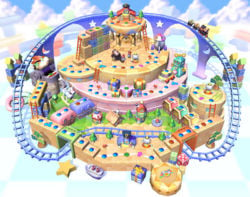
|
Toy Dream | Created from the dreams of toys, Toy Dream is built on a light-blue, checkered platform among the clouds, where it is built out of toys, including a toy train, toy ship, presents, a robot, toy soldiers and other such objects. A toy train can be taken, which players can ride to get from the bottom part of the board to the top part and vice versa. If any other players are on the toy train, then they will also be taken to either the upper train station of the board or lower train station that the player in the train is to appear at. Players riding may also use |
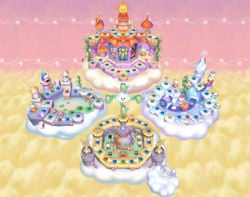
|
Rainbow Dream | Created from the dreams of rainbows, Rainbow Dream is suspended above the clouds with a backdrop of a pink, starry sky. Rainbow Dream comprises five independently floating clouds, one for each type of weather: cloudy, rainy, sunny, and snowy, and one that serves as the start space. The main way of getting around the board is by getting to the "rainbow spaces". Whenever players get to one of them, Klevar asks them if they want to cross the rainbow bridge for 5 coins. If paid, a rainbow appears for them to go to the next area. |
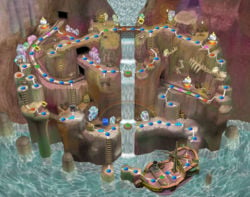
|
Pirate Dream | Created from dreams of adventure, the board is reminiscent of an abandoned, cavern mine and a seaside cliff with waterfalls, where players can search for treasure in some of the ? Spaces it provides. A pirate ship can be accessed on the bottom of the board. Thwomp gives players a lift to a higher part of the board for 10 coins. For the same price, Whomp lets players use the ladder he is blocking. |
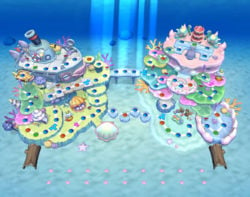
|
Undersea Dream | Created from dreams of the ocean, the main goal of this board is for the players to reach the Star by going across the coral reef. The board is divided into two sections connected by bridges. Noteworthy features are the sunken ship, the whale, and the tiny shops set up by Cheep-Cheeps. |
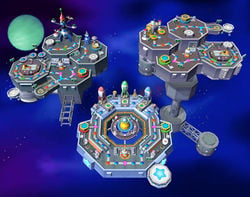
|
Future Dream | Created from dreams of the future, the board is reminiscent of a space station in Outer Space. The goal for this board is for the players to get to the Star by moving across the space station. Divided into three platforms, the only way to travel about the station is by teleportation devices, rocket ships, or shortcuts. |
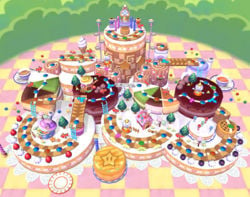
|
Sweet Dream | Created from the dreams of desserts, the board is placed on top of a giant picnic mat where players have to cross all kinds of cakes and candy to get to the Stars. |
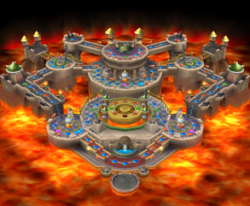
|
Bowser Nightmare (unlockable) | This board is created from Bowser's dreams. When players land on Happening Spaces Bowser appears and causes events that may hinder them. Players unlock this board when they beat Story Mode. |
Spaces
Normal spaces
These spaces are normal spaces that players land on, triggering their own effects.
| Image | Space | Description |
|---|---|---|

|
Plus Space | If players land on this space, they receive three coins. On the last five turns, the coins received may triple. |

|
Minus Space | If players land on this space, they lose three coins. On the last five turns, the coins lost may triple. |

|
Happening Space | If players land on this space, they trigger an event. The event varies within the board. The event may help or hinder one or more players. |
| File:Bowser Square.PNG | Bowser Space | If players land on this space, Bowser appears. He can cause the following events: Bowser Revolution, which he divides everyone's coins equally, Bowser Minigame were he forces everyone to play his minigames, Bowser Shuffle, which he randomly swaps places with all of the players, or Bowser Bonus, which he steals a Star from the player. Rarely, Donkey Kong might appear and punch Bowser, which causes him to steal 10 or 20 coins from the player who landed on his space. |

|
DK Space | This space is always placed on a random spot on the board, and landing on it will make Donkey Kong do one of three events: DK Bonus, were DK gives the player coins equal to a Dice Block roll, DK Minigame were all players participate in a minigame where they collect bananas. At the end, Donkey Kong gives everyone coins equal to the amount of bananas that they got by once, twice, or even thrice. In DK Roulette, both the player and DK will roll a Dice Block, with DK going first. If the player rolls a higher number than DK or if he rolls a 1, the player will receive a free Star. If Donkey Kong rolls a higher number or a 10, the player will lose and will not get anything. |

|
Star Space | When a player passes by this space, he or she will be asked by Eldstar if the player will trade 20 coins for a star, or not. |
Capsule spaces
These are regular spaces (either blue or red spaces) that have an additional effect of a capsule. The icon of the space indicates what type of effect players are to expect, but the actual effect is unknown until players land on them. Players can override these spaces by tossing another capsule on top of them.
| Image | Space | Description |
|---|---|---|

|
Mushroom Space | This space bestows a Mushroom to the player if landed on. It can be a Cursed Mushroom, Mushroom or a Super Mushroom. |
| File:SpaceCapsule -Movement.png | Move Event | The capsule effect deals with mobility around the board. Such capsules include the Warp Pipe Capsule and the Klepto Capsule. |

|
Coin Event | Coins are affected when players land on this space, either through gaining coins or losing coins. |

|
Bob-omb | This space is created when a Bob-omb Capsule is thrown to a space. A countdown initiates whenever a player passes this space. At the third counter, a Bob-omb appears on the player's hands and explodes, causing the player to lose 20 coins. |

|
Bank Space | This space is created when a Koopa Bank Capsule is thrown to a space. Every time a player passes this space, the player pays 5 coins to store in the bank. If a player lands on this space, the player is rewarded with all coins in the bank. |

|
Capsule Event | Capsules are affected when players land on this space in a variety of ways, either helping or hindering the player. |

|
Tweester | This space is created when a Tweester Capsule is thrown to a space. Landing on it causes a Tweester to spawn, who then moves the Star Space location to another area on the board. |

|
Duel Space | This space is created when a Duel Capsule is thrown to a space. Landing on it causes a Duel minigame to occur. |

|
Chain Chomp | This space is created when a Chain Chomp Capsule is thrown on a space. If a player lands on it, a Chain Chomp will appear and lets the player steal a star or coins from a chosen player. |

|
Chance Space | This space is created when a Chance Capsule is thrown to a space. Landing on it causes the Chance Roulette to occur. |
Capsules
Mario Party 5 does away with the traditional item system of the previous games, and instead introduces items called capsules, which can be obtained for free by passing capsule machines. Capsules can be thrown on the board up to ten spaces in front of them, and the player that lands on the capsule space receives its effects. Alternatively, players can pay a fee to use the capsule on themselves; the fee varies by capsule. Below is a list of all twenty-eight capsules found in Mario Party 5 and a description describing their effects.
Move Event
| Item | Description | Cost | |
|---|---|---|---|
| File:Bubble Capsule.JPG | Bubble Capsule | When a player is affected by this capsule, the affected player will be forced to move ten spaces forward. During this, the player will lose all of their capsules and can not choose which direction to take at a junction. | Ten Coins |
| File:Cursed Mushroom Capsule.JPG | Cursed Mushroom Capsule | When a player is affected by this capsule, the affected player will only be able to roll numbers one to five on the Dice Block. | Five Coins |
| File:Klepto Capsule.JPG | Klepto Capsule | When a player is affected by this capsule, the affected player will be taken to another player's space, chosen by a roulette. | Ten Coins |
| File:Mushroom Capsule.JPG | Mushroom Capsule | When a player is affected by this capsule, the player will be able to roll two Dice Blocks. Should the numbers match (e.g., two threes), the player will get 10 coins (30 coins for two "7's"). | Five Coins |
| File:Super Mushroom Capsule.JPG | Super Mushroom Capsule | When a player is affected by this capsule, the player will be able to roll three Dice Blocks. Should the numbers match (e.g., three nines), and the player will get 30 or 50 Coins (100 coins for three "7's"). | Ten Coins |
| File:Warp Pipe Capsule.JPG | Warp Pipe Capsule | When a player is affected by this capsule, they will swap places with another player which is determined by a roulette. | Ten Coins |
| File:Wiggler Capsule.JPG | Wiggler Capsule | When a player is affected by this capsule, they will be taken directly to the Star Space, but they still have to purchase it for 20 coins. | Twenty Coins |
Coin Event
| Item | Description | Cost | |
|---|---|---|---|
| File:Bob-omb Capsule.JPG | Bob-omb Capsule | When a player is affected by this capsule, they will lose twenty coins. For this capsule's effect to be initiated, the space it is tossed onto must be passed or landed on three times. | Free |
| File:Bullet Bill Capsule.JPG | Bullet Bill Capsule | When a player is affected by this capsule, the affected player will be able to steal thirty Coins from any opponent the player passes on their next roll. They can not choose which direction to take at a junction however. | Five Coins |
| File:Coin Block Capsule.JPG | Coin Block Capsule | When a player initiates this capsule, the player will receive ten Coins from a Coin Block. | Five Coins |
| File:Goomba Capsule.JPG | Goomba Capsule | When a player initiates this capsule, the player will swap coins with another player, chosen by a roulette. | Five Coins |
| File:Hammer Bro. Capsule.JPG | Hammer Bro Capsule | When a player initiates this capsule, the player will lose ten Coins. | Five Coins |
| File:Koopa Bank Capsule.JPG | Koopa Bank Capsule | When a player throws this capsule at a space, that space will become a Bank Space. If the player uses it on themselves, they will acquire all previously deposited Coins in the bank. | Ten Coins |
| File:Paratroopa Capsule.JPG | Paratroopa Capsule | Whenever a player initiates this capsule, the player rolls a Dice Block to determine how many Coins their opponents lose. | Ten Coins |

|
Piranha Plant Capsule | Whenever a player initiates this capsule, the player will lose half of their Coins (this also includes any remainder). | Five Coins |
| File:Spiny Capsule.JPG | Spiny Capsule | When a player initiates this capsule, the player steals ten Coins from another player chosen at random. | Five Coins |
Capsule Event
| Item | Description | Cost | |
|---|---|---|---|
| File:Kamek Capsule.JPG | Kamek Capsule | When a player initiates this capsule, all players' capsules are shuffled around by Kamek. | Ten Coins |

|
Lakitu Capsule | When a player initiates this capsule, the player can steal a capsule from another player of their choosing. | Ten Coins |
| File:Magikoopa Capsule.JPG | Magikoopa Capsule | Whenever a player initiates this capsule, the player will swap their capsules with another player's capsules. The player chosen is determined by a roulette. | Ten Coins |
| File:Mr. Blizzard Capsule.JPG | Mr. Blizzard Capsule | Whenever a player initiates this capsule, the player will lose all of their capsules. | Ten Coins |
| File:Ukiki Capsule.JPG | Ukiki Capsule | Whenever a player initiates this capsule, the player will choose another player that will lose all of their capsules, which are tossed onto random spaces. | Ten Coins |
Special Event
| Item | Description | Cost | |
|---|---|---|---|
| File:Bone Capsule.JPG | Bone Capsule | When a player is attacked by a Chain Chomp, this capsule will activate automatically and protect them from it. This capsule cannot be used on a player or thrown onto a space; it will only be discarded. | N/A |
| File:Chain Chomp Capsule.JPG | Chain Chomp Capsule | Whenever a player initiates the effects of this capsule, the affected player will be able to steal Stars or Coins from a selected player for a fee. The fee depends on the service. | Fifteen Coins |
| File:Chance Capsule.JPG | Chance Capsule | When tossed on a space, a Chance Time Space will appear. If used on a player, Chance Time will occur. | Twenty Coins |
| File:Duel Capsule.JPG | Duel Capsule | When tossed on a space, a Duel Space will appear. If used on a player, that player will initiate a duel against another player. | Fifteen Coins |
| File:Miracle Capsule.JPG | Miracle Capsule | Unlike most other capsules, this capsule can neither be used directly on a player, nor be tossed on a space (although it can be discarded). When a player carries three Miracle Capsules, the three capsules will be activated automatically, giving all the Stars the player in first place has to the player in last place. | N/A |
| File:Tweester Capsule.JPG | Tweester Capsule | Whenever a player initiates this capsule, the Star Space will be moved to another location. | Fifteen Coins |

|
Bowser Capsule | Whenever a player receives this capsule, Bowser will appear and throw it onto a randomly chosen Minus Space, turning it into a Bowser Space. | N/A |
Minigames
- Main article: List of Mario Party 5 minigames
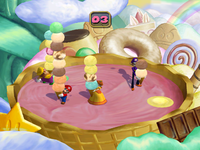
Mario Party 5 has a total of seventy-seven minigames, including some of the extra minigames found in Bonus Mode, having in total nine classifications of the minigames. Due to Donkey Kong becoming his own space, this game introduces DK minigames to the series, where players can collect bananas in those minigames to exchange for coins. Duel minigames also return from Mario Party 3, where dueling is absent in Mario Party 4. Minigame titles are often word plays, alliterations, and assonance, localized differently in other regions.
Staff
- Main article: List of Mario Party 5 staff
Mario Party 5 is developed by Hudson Soft, the primary developer of the Mario Party series until Mario Party 9. CAProduction, who also has a history of developing for Mario Party games, is involved co-developing this alongside Hudson. The game is directed by Kenji Kikuchi, who also directed the previous four Mario Party titles. Shuichiro Nishiya, who is a planning advisory for this game, would go on to be the director of much of the later Mario Party installments, starting with Mario Party 6.
The music in Mario Party 5 was composed by Aya Tanaka. It is different from the other games in that the music sounds sophisticated and (despite being synthesized as in most Mario Party games) has the illusion of being played by a professional symphony orchestra. This may be caused by the use of sounds that sound like true instruments, especially the harpsichord. This apparently didn't catch on, however, as Aya Tanaka has not composed any other Mario Party game. However, this game's sequels, Mario Party 6 and Mario Party 7, have progressed to an orchestrated musical score.
Reception
Mario Party 5 received mostly mixed to positive reviews from critics. Game Informer's Andrew Reiner cited the example of coin redistribution in the game, which meant that "you could win every mini-game and collect the most coins and still end up in last place", when giving a second option of the game. GameSpot's Ryan Davis processed to note "If you bought Mario Party 4 last year, Mario Party 5 is hard to recommend.", noting a lack of change to the series formula. The game's graphics received a mediocre response, with GameSpot commenting that the presentation is "starting to seem a bit antiquated" when noting that the character models did not seem to have been updated from Mario Party 4. Generally, critics cited having a fun experience in Mario Party 5, although the minigames received a more enthusiastic reaction than the actual board game, with GameSpy commenting that "the sheer volume can keep you compelled. If only you didn't have to deal with all that BS in-between" when referring to gameplay of the actual board game.
Mario Party 5 is the 12th best selling game for the Nintendo GameCube, selling approximately 2.08 million units: 807,331 copies in North America, 697,472 copies in Japan, and about 400,000 copies elsewhere, as of December 31, 2009.
Quotes
- Main article: List of Mario Party 5 quotes
- "Happy times indeed! It's time for a Bowser Mini-game!" -Bowser
- "The player with the highest number wins. Good luck!" -Eldstar
- "Welcome to Dream Depot!" -Klevar
- "I'm here to help (character's name)!" -Toad
- "In this Card Party, you turn cards over as you move across the board." -Mamar
Pre-release and unused content
The pre-release title screen is different from the final version. Unlike the final version, it features various playable characters running around the screen. However, it does strike a resemblance with the file select screen in the final version.
The character select screen is also significantly different from the final version.
There is also data for two unused capsules, the DK Capsule and the VS Capsule. [1]
Music
- Main article: List of Mario Party 5 music
Gallery
- For this subject's image gallery, see Gallery:Mario Party 5.
- MP5Logo.jpg
Logo
- MP5KoopaKids.PNG
Media
References to other games
- Super Mario Bros.: Pop-Star Piranhas features three differently-styled covers of the main theme. A rendition of the underwater theme is used in Submarathon.
- Super Mario 64: Coin Cache takes place in front of Princess Peach's Castle, which looks very similar to how it did in this game. Plastic Dorries appear in the minigame Tug-o-Dorrie.
- Paper Mario: The Star Spirits return in this game.
- Mario Party 3: Some of the playable characters' voice clips were reused in this game.
- Luigi's Mansion: Professor E. Gadd is mentioned as having created several vehicle parts in Super Duel Mode.
- Super Mario Sunshine: Mecha-Bowser makes a cameo in Toy Dream.
- Mario Party 4: The Chomp Call is featured in the minigame Chomp Romp. Beach Volley Folley returns in this game, though it is simply named "Beach Volleyball" and now includes the option to use special gimmick balls. Also, several voice clips are recycled.
References in later games
- Dance Dance Revolution: Mario Mix: The Toy Dream song is rearranged in the song, Cabin Fever.
- Mario Party 8: The design of Princess Peach's Castle from this game is reused in Crank to Rank.
- Mario Party DS: The song "Think It Out" from this game has an intro that sounds similar to that of "Serious Competition". The character celebration and lose portraits are reused, along with the Mario Party 8 portraits.
- Super Smash Bros. Brawl: Eldstar, Misstar and Muskular appear as stickers.
- Mario Party: The Top 100: Seventeen minigames return in this game, and come complete with a cover version of their original minigame completion theme. The Star Spirits make a cameo in the Characters section of the Series Guide.
Trivia
- The capsule depicting a Toady is incorrectly labeled as "Magikoopa Capsule". Later Mario Party games correctly labeled it as "Toady Orb".
